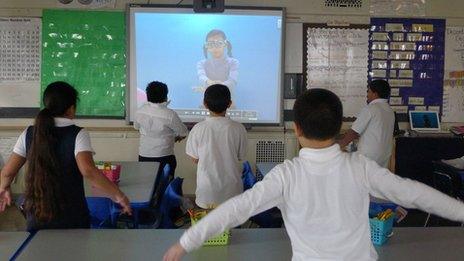Obesity rates fall in Philadelphia
- Published
- comments

Children at the Philadelphia school carry out their 15-minute exercise routine
What is the greatest single threat to Americans' safety and well-being in the coming decade? Al-Qaeda? Climate change? The towering debt and deficit?
Wrong, wrong and wrong. The answer is everywhere you go in America, sold over-the-counter and consumed in astonishing scale and quantity.
Americans are drowning in unhealthy food and tottering under the obesity that that food - and lack of exercise - creates.
And, staggering alongside them is a healthcare system paying out of tens of billions of dollars a year to deal with obesity-related illness - heart disease, strokes and Type 2 diabetes.
America is the fattest industrialised nation on earth - the UK is very close behind. And where it leads, the developed - and now the developing - world has followed.
Getting moving
The good news? The tide of obesity can be turned. The curiosity? For a country that believes in light-touch government, America seems to have taken pretty serious official intervention to start to turn things around.
Litter is scattered over the streets around Issac Sheppard school in north Philadelphia. The terraced housing nearby is run down. Here and there windows are boarded up.
The place feels deeply uncared for. Groups of young people gather on street corners to no apparent purpose.
Issac Sheppard's head teacher, Jim Otto, half-jokes that officials from the school district do not come to the school much, so concerned are they for their physical safety and that of their cars.
Inside one of the classrooms of the grey 19th Century stone school building, there is a different kind of lesson going on.
Led by a video projected on to a whiteboard nine children, a mix of Latinos and African-Americans, walk or jump on the spot, swing their arms, stretch and reach in an exercise class that lasts around 15 minutes.
"We tried a walking club," says Mr Otto, smiling, "but we got shot at."
Obesity 'a norm'
Children at the school do the exercise class at least once a day, some of them twice. It is a voluntary initiative enthusiastically embraced by the school.
"Our children want to run," Mr Otto says. "They want to play, they want to compete. But it's just not practical, it's not possible, it's not safe for them to do that."
"If we don't give them the opportunity to do that here then that opportunity is going to slide by."

But maybe the exercise lessons will go beyond the classroom: "Our hope really is that our kids are going to want to say to their parents, you know, 'we could play this game,' or 'we could go to the park,' or 'we could walk,'" he adds.
What is happening at Issac Sheppard is part of a Philadelphia-wide movement led by the city government: Get Philly Healthy.
In 2010, a city health department report noted gloomily that obesity had become "a norm and a public health crisis" in the city, with 64% of adults and 57% of children aged 6-11 overweight or obese.
In north Philadelphia, 70% of children were overweight or obese.
Get Philly Healthy has disconnected deep fat fryers in every Philadelphia school, removed sugary-snack vending machines, built bike lanes, encouraged exercise in schools and businesses and sponsored fresh-produce fridges and fresh-fruit racks in 650 corner stores around the poorest parts of the city.
And Philadelphia's obesity rate is falling - not just levelling out, but falling - down 5% from 2006 to 2010, with the greatest declines amongst African-American boys and Hispanic girls.
'Very long war'
The city's health commissioner, Dr Donald Schwartz, is careful not to take the credit. It is too early, he says, to make a link between the city's efforts and the drop in the obesity rate.

Corner shops have been given money, and sometimes fridges, to stock healthy food
"We're convinced that we really are seeing a reduction in childhood obesity in the city," he says, "and we have a hint, although no confirmation yet, of the first turn in adult obesity in Philadelphia."
There are limits to how far the city can go. A proposed tax on sugary drinks - identified by the city's health department as one of the key drivers of obesity - was defeated.
There are structural barriers to get around as well. Dr Schwarz says that when the city of Baltimore tried to get fresh fruit into its corner shops it failed because the single distributor that served the shops refused.
And, according to Dr Schwarz, national policies produce perverse and deeply harmful incentives.
Subsidies for the corn that goes into the sugar substitute, high fructose corn syrup, have seen the inflation-adjusted price of sugary snacks fall, whilst that of fruit has risen.
Food - harvesting, processing and distributing - is a huge and profitable business, and not without lobbying resources.
By opening many different fronts in the fight against obesity, the city may have begun to turn things around. But Dr Schwarz sounds a note of caution.
"This is not a battle," he says, "This is a very long war."
- Published28 November 2012
- Published7 November 2012